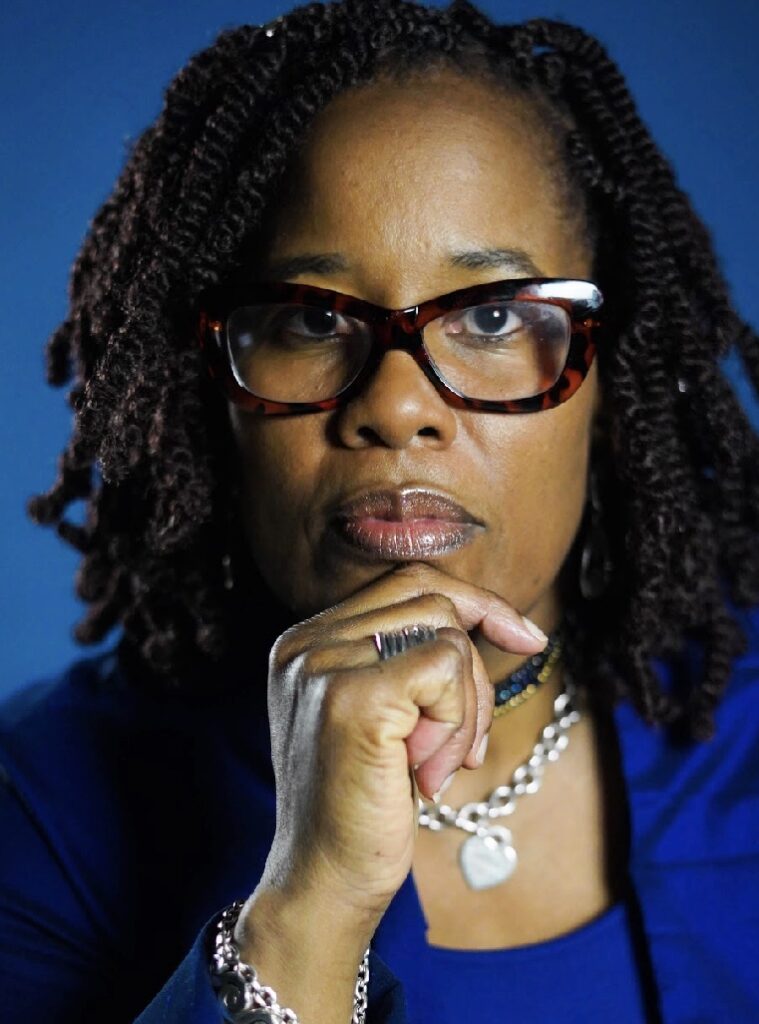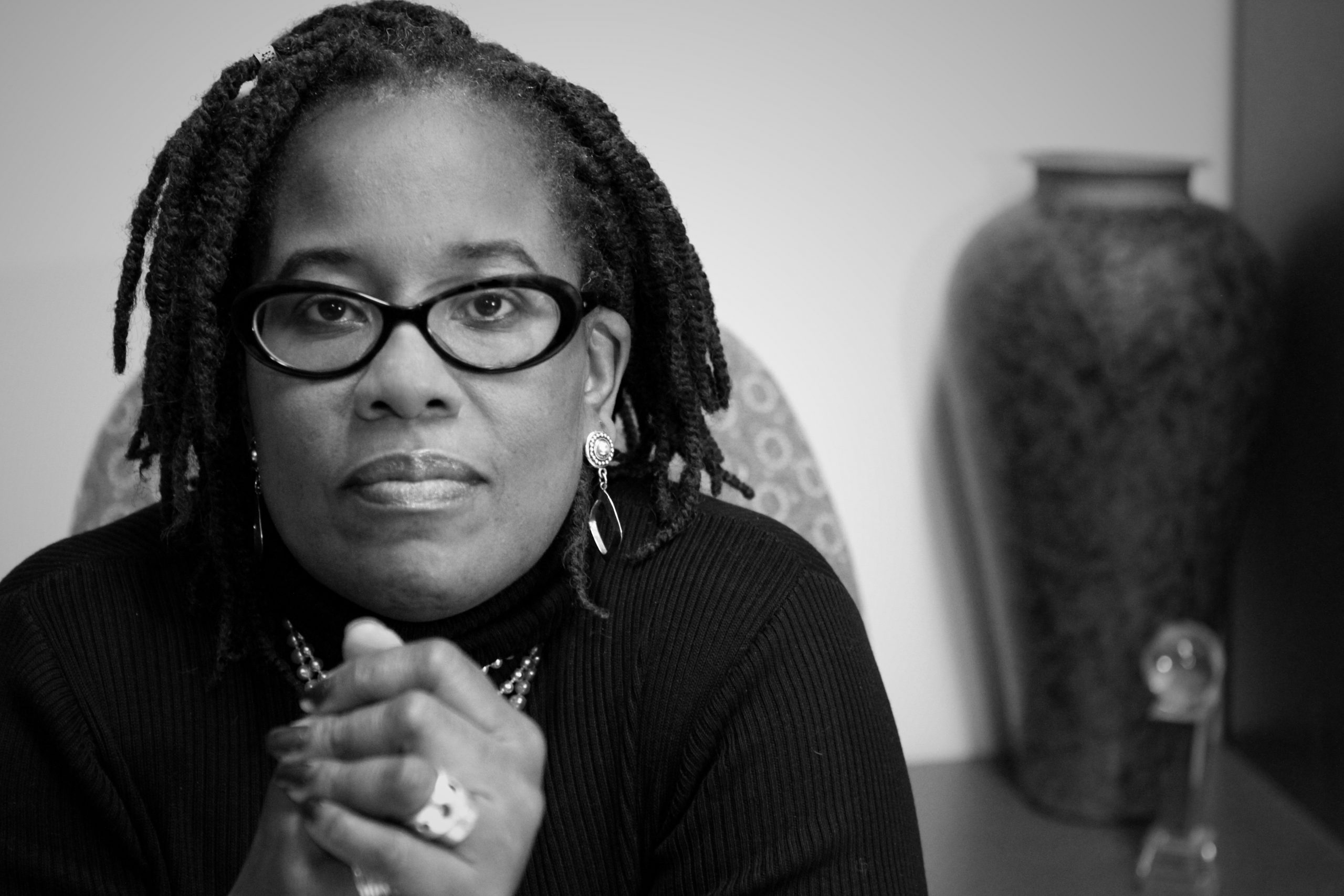By Michele Wojciechowski
In 1980, while spending the summer with family in South Carolina, 13-year-old Karsonya “Dr. Kaye” Wise Whitehead noticed that the corner grocery store owner had kept up the “Whites Only” and “Colored Only” signs. She was offended and wanted him to take them down. The teen decided to stage her first protest. She told her grandmother that she was going to march every day in front of his store until he took the signs down.
The proprietor took them down from the counter. But he later had them framed and put on the wall to make them “art.”
“My grandmother gave me a similar framed ‘Colored Seating Only’ sign so that I would always remember that moment in my life,” says Whitehead, Ph.D. ’09, language, literacy, and culture.
While she didn’t get the exact result that she wanted, Whitehead did see that her actions could make a direct change in her community. This lesson would guide Whitehead as she found ways to amplify her voice.

“It changed my life,” Whitehead says of the language, literacy, and culture program. “I knew that I wanted to be in a field where I could research, write about, and teach Black women’s history.”
After living in New York City—working first at MTV and then at a PBS affiliate making documentary films—Whitehead, along with her husband Johnnie and their sons, Kofi and Amir, moved to Baltimore 16 years ago. She taught in Baltimore City middle schools for four years and was named Maryland History Teacher of the Year before she left to pursue her Ph.D. in language, literacy, and culture in 2006 at UMBC.
From teacher to student
In 2005, Whitehead was still working as a teacher when a friend sent her copies of the 1863–1865 diaries of Emilie Davis. “I started reading the diaries at night, and when I realized that I was reading the diaries of a free black woman, I knew that I wanted to transcribe and publish them,” recalls Whitehead. Because she didn’t know how to do this kind of work, she started looking into Ph.D. programs that could guide her.
Whitehead settled on UMBC, remembering the impression President Freeman Hrabowski had made on her years before after hearing him speak at an event. “Like most people, I was amazed by the depth of his passion, his ability to take complicated issues and make them understandable, his desire to get [people] motivated to push beyond their comfort zone, and his dedication to helping Black students—and all students of color—receive their doctoral degrees,” she says. “When I decided to apply to a doctoral program, the only place I wanted to attend was UMBC.”
“Dr. Wise Whitehead’s commitment to both local and national social justice issues exhibits the best of UMBC,” says Kimberly Moffitt, associate professor and LLC program director, “and how we work to support our graduate students in their desires to excel and thrive beyond a classroom setting.”
“It changed my life,” Whitehead says of the language, literacy, and culture program. “I knew that I wanted to be in a field where I could research, write about, and teach Black women’s history.”
And that writing Whitehead wanted to do about Emilie Davis? It became her dissertation as well as her first book, Notes from a Colored Girl: the Civil War Pocket Diaries of Emilie Frances Davis.
Taking it to the airwaves
In 2015, Whitehead was approached by Beverly Burke, then-news director of WEAA, 88.9, out of Morgan State University, about coming on to do one- or two-minute African American history spots on the station. At first, she appeared monthly, but then Whitehead began getting requests to come on other hosts’ shows and progressed to being a guest host. Three years ago, the station’s general manager Malarie Pinkard Pierre approached Whitehead with the idea of giving her an afternoon slot for her own talk show.
Whitehead was thrilled.
Her show, “Today with Dr. Kaye” runs on WEAA, Monday through Friday from 3 to 5 p.m. “It’s unbelievable! That’s prime drive time, when you’ve got three generations in the car listening,” says Whitehead. “To be in that time slot is really exciting. The reception has been phenomenal.”
Whitehead is one of only a handful of black women in the country who have afternoon drive time radio talk shows. Building on the blocks of her early activist efforts and her continued education at UMBC, Whitehead knows that her voice has power. At the start of every show, she begins with, “We have conversations that matter.”
“[We have] conversations that are designed to challenge us, to make us think, to make us laugh, and sometimes to make us cry,” explains Whitehead, who wants her radio show to help make changes in Baltimore. “When I got into doing this show, I made a commitment to speak to, with, and for the people of Baltimore City.”
Whitehead says that her listeners range in age from young children to 85-year-olds, and because the show is on Facebook Live, she has listeners from all over, including callers from Alaska, Canada, and Jamaica. “I tell people that we have a two-hour window where they can come and wrestle with some questions with us and join us at the kitchen table,” says Whitehead.
In addition to her radio show, Whitehead writes a bi-monthly column for the AFRO, op-eds for The Baltimore Sun, and works full-time as an associate professor of communications and African American studies at Loyola University.
While she loves her activist work, Whitehead admits that her greatest joy is being a wife and mom. “Before I had the show, I was a black mommy activist. I was involved in a lot to help my sons…to help carve out a world where they can get home safe,” she recalls.
“Baltimore is a city that’s in a lot of pain, and people are searching for someone who’s going to tell them the truth, listen to them, and fight for and with them. I’ve made a lot of good friends and colleagues who are willing to do battle with me,” says Whitehead. “I’ve fallen in love with this city, and I’m willing to fight to bring about changes.”
*****
All photos courtesy of Karsonya Wise Whitehead Ph.D. ’09.

